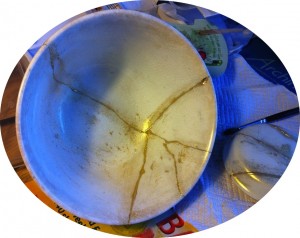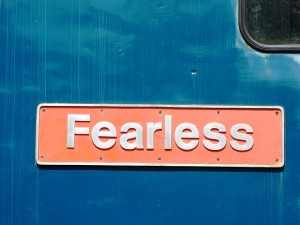
There is a Japanese art form originating in the 15th century called kintsugi. It is the process of repairing broken ceramics by mending them with a clear lacquer resin that is mixed with gold powder (or other powdered metals). In filling these cracks, these broken aspects of the pot or the jar, the cup or the bowl, transformation occurs. We see beauty and a new kind of wholeness that draws us to it. Some of the once-called damaged pieces fetch higher prices than their so-called flawless counterparts.
I think there is wisdom that has wider application. It is certainly my experience with humans: those with cracks and fissures, wrinkles and blemishes, are far more interesting than sheer perfection. For good or for ill, this has always been my own tendency: I cast my lot with the broken-hearted.
The Quaker writer, Parker Palmer, has observed that there are two ways that a heart can break: into a thousand sharp-edged shards that quickly, or eventually, are aimed at the source of pain and inflicting pain on others. Or our hearts can break open.
 Open to what? We don’t always know, but our hope is to a larger compassion and a greater capacity to hold the world’s pain and joy, our own and that of others. The Unitarian Universalist minister at All Souls in Tulsa, Oklahoma (our largest Unitarian Universalist congregation, with 2000 members), Marlin Lavanhar, once preached
Open to what? We don’t always know, but our hope is to a larger compassion and a greater capacity to hold the world’s pain and joy, our own and that of others. The Unitarian Universalist minister at All Souls in Tulsa, Oklahoma (our largest Unitarian Universalist congregation, with 2000 members), Marlin Lavanhar, once preached
“…the church’s role is to help us take our heart break and turn it into a sacred fire to use to transform the world. We need to be able to transfigure our pain, anger, and fear into a fearless passion. One mistake we often make is trying to lead with our strengths rather than our heartbreak.”
I have been thinking of what this means for me as a minister – to lead with my heartbreak. I have been wondering what it means to me after nearly a half-century walking on this Earth. I think it means that vulnerability is not necessarily weakness. This is not an easy lesson for me; both my intellect and my heart resist. Yet, I admire this trait in others and know that there is something profoundly wise at play here. So I want to pay attention.
I have also been thinking about what this means for church to be able to apply sacred fire that we might come out transformed with a “fearless passion.” What comes to your mind when you read that phrase?
 I wonder if it’s like that kintsugi process – each of us comes bruised and tender, perhaps even broken, or merely cracked (which is quite enough really), and engaging in the life of church applies a kind of golden glue, a holy adhesive, that allows us to go back into the world, somehow more whole than ever before, perhaps with that “fearless passion” as our companion and guide.
I wonder if it’s like that kintsugi process – each of us comes bruised and tender, perhaps even broken, or merely cracked (which is quite enough really), and engaging in the life of church applies a kind of golden glue, a holy adhesive, that allows us to go back into the world, somehow more whole than ever before, perhaps with that “fearless passion” as our companion and guide.